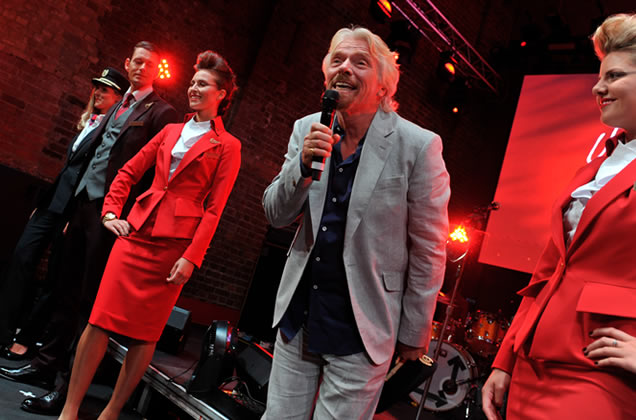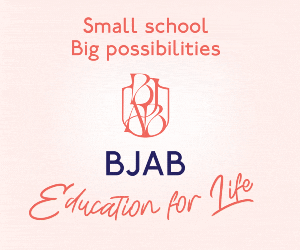Sir Richard Branson has plenty to be proud of: from starting a mail order record business when he was just 16 and turning it into the iconic Virgin Records, to laughing in the face of the competition to launch Virgin Atlantic in the mid-80s, the entrepreneur is an inspiration to many. The 64-year-old Branson is the founder and chairman of Virgin Enterprises and according to Forbes magazine, he is the sixth richest UK citizen – with a net worth of reportedly $4.6 billion.
When Together meets Branson in Shoreditch, East London, it is at an event to showcase the brand new uniforms for Virgin Atlantic, designed by none other than British fashion icon Vivienne Westwood. The entrepreneur spoke of choosing Westwood because “she can come up with the most outrageously exciting clothes. Our cabin crew need clothes that will make them feel either very handsome or very beautiful”.
Speaking of his proudest moment, Branson speaks of striving against adversity during the launch of his transatlantic airline, Virgin Atlantic, in 1984. “I was never expecting the lengths that British Airways went to put us out of business. That they would get people to go through my rubbish bins to try and find damaging things about us. They went to the nightclubs I visited to look for needles, so they could get a story about drugs in News of the World; they tapped into our computer information and would ring up our passengers, pretending to be from Virgin, saying that Virgin’s flights were cancelled but they could switch onto British Airways. And so it went on. Fortunately, people who worked for BA were so upset by what they were doing that they came to us. We managed to win the biggest court damages in history, which became known as the ‘British Airways Christmas Bonus4; we distributed it to all our staff at Christmas.”
Even with triumphs like his win over British Airways, it would be unusual for Branson to have navigated his career without regrets. However, he is famously renowned for stating that he has none. Even when he has found himself in dire straits, he has remained unflinchingly optimistic. “[British Airways] came that close to driving the Virgin empire over the cliff, to the extent that my bank manager got completely panicked and on the Friday told me they would close us on the Monday. Somehow over the weekend we managed to scrape through: there’s a thin dividing line between success and failure and we managed to stay the right side of that line.”
Branson is a firm believer that passion is a must in any business model, and he is as enthusiastic about everything Virgin does today as he was when he first started the company. “I’m passionate about life and I’m passionate about all the things that the team at Virgin have created. It would be very sad if everybody else was working enormously hard to make sure that the company they work for is the best in the world and I wasn’t equally as excited and passionate. I’m as interested as I was thirty years ago.”
Branson attributes his success, in part, to the importance he places on branding and attention to detail. “Your brand is your reputation; it’s almost your everything. If people trust your brand then you’re going to do well, but if they don’t you won’t.” He is convinced that attention to detail is absolutely crucial. “It sounds like a simple thing your Mum would tell you, but it is really important and too many companies forget that. For example, if you’re on a plane and you need gluten-free food, so you pre-ordered it but the airline forgot to put it on the plane, you’re going to be pretty pissed off, because you’re going to go hungry. From a customer service perspective, getting all those little details right in a company is critical.”
The business man and philanthropist knows exactly what he’s doing when it comes to starting a successful company, and isn’t short of advice for up and coming business owners. “Right now in Great Britain it’s about the most exciting time for entrepreneurs there’s ever been. We lobbied the British government for years to try to introduce start-up loans for people wanting to become entrepreneurs rather than just loans for people going to university. And the government’s gone along with that, so companies like Virgin are finding mentees to work with. There are thousands of people beginning to get those start-up loans, so it’s an exciting time.”
Branson’s newest venture is Virgin Galactic, which aims to provide the first commercial space travel flights, with Katy Perry, Justin Bieber and Professor Stephen Hawking already signed up as civilian astronauts. Although tickets are currently $250,000, Branson hopes that will change over time. “Nine out of ten people would love to fly on Virgin Galactic and go to space, so it’s really up to us to try and get the price down in the years to come to enable hundreds and thousands of people to be able to become astronauts. We don’t expect people to earn $250,000 dollars to buy tickets,” he says, implying that eventually, you won’t have to be as wealthy as Branson himself to travel out of this world.







